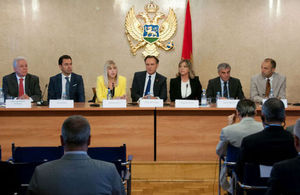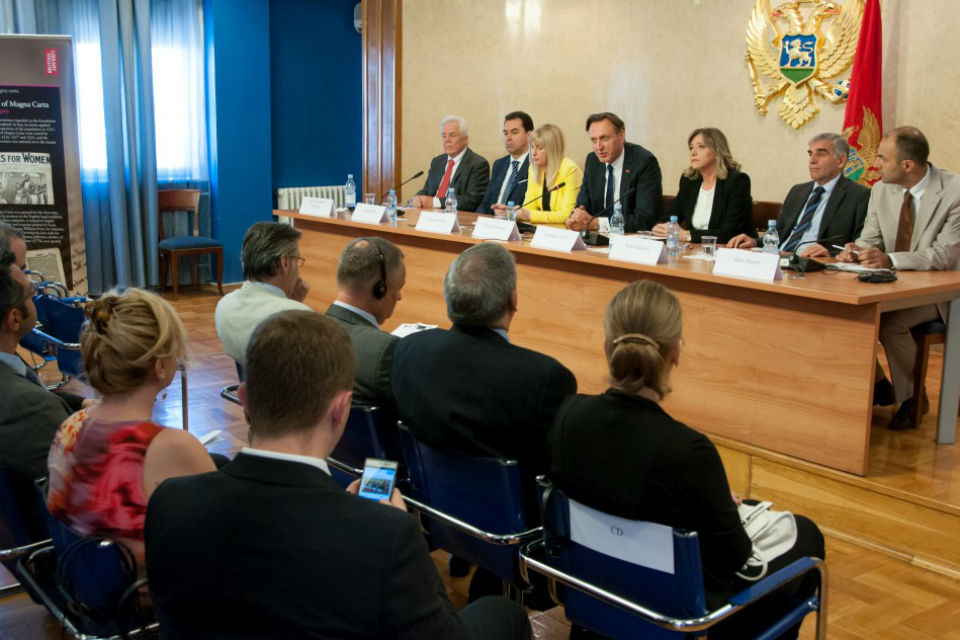800 years of Magna Carta celebrated in Montenegro
Montenegro has joined the global events celebrating 800 years of the Magna Carta.

Magna Carta event at the Parliament [Copyright: Parliament of Montenegro]
In cooperation with the Parliament of Montenegro, NGO Civic Alliance, the Constitutional Court of Montenegro, and the Ombudsman we hosted a conference to mark 800 years since the adoption of “Magna Carta Libertatum”.
The gathering was attended by representatives of diplomatic missions in Montenegro, national bodies and institutions, civil society organisations, and Members of Parliament from the Committee on Political System, Judiciary and Administration of the Parliament of Montenegro.
The conference was opened by MP Ms Snežana Jonica, Deputy Chairperson of the Committee on Political System, Judiciary and Administration, who also moderated the panel.
The panel comprised:
- Mr Ranko Krivokapic, President of the Parliament of Montenegro,
- Ms Desanka Lopicic, President of the Constitutional Court of Montenegro,
- Mr Zoran Pazin, Minister of Justice,
- Mr Sucko Bakovic, Protector of Human Rights and Freedoms,
- Mr Boris Raonic, President of NGO “Civic Alliance” and
- Mr Ian Whitting, OBE, British ambassador to Montenegro.

Magna Carta event at the Parliament [Copyright: Parliament of Montenegro]
In his address, the President of the Parliament Mr Krivokapic spoke of the importance that Magna Carta Libertatum retained in contemporary constitutional systems even eight centuries after its adoption. He said that in Slavic languages the word “constitution” conveyed a sense of limiting power, preventing misuse of power and ensuring that no interest of any individual or government could be above the constitution. Adherence to the rule of law was essential to provide stability and security for every citizen, and formed the basis of economic growth and prosperity in every developed nation.
Ms Desanka Lopicic, President of the Constitutional Court, said that Magna Carta Libertatum was both a legal and political document, representing the cornerstone of constitutionality; the legal act at which the modern legal states were built.
Minister of Justice Mr Zoran Pazin stressed that this document was a beacon of freedom for Europe and for the world, and a significant British contribution to the cultural map of humanity. He echoed Speaker Krivokapić’s remarks in noting that the rule of law, which depended on legal security, was necessary in limiting absolute power. He underlined that this was a continual process, with the adoption of appropriate regulations, and that England had earned gratitude for building the path of modern constitutionalism.
Mr Sucko Bakovic, Ombudsman, said that Magna Carta was a document guaranteeing the three universal rights and values of: life, freedom and dignity.
Ambassador Ian Whitting spoke of the historic nature of this document, which was among the first in the world to introduce the principle of equality before the law, creating the preconditions to hold anybody to account. He added that the Magna Carta remained an instructive and inspiring example of the need to value both the spirit and the implementation of the law, in order to ensure its full effect.
Mr Boris Raonic, President of the NGO Civic Alliance, spoke of Magna Carta’s resonance in aspects of the rule of law in contemporary legal systems. It was a cornerstone of human rights, which were essential in developing a prosperous economy.
During the event, we displayed a framed facsimile of the Magna Carta, kindly provided to us by Harrisson Solicitors.